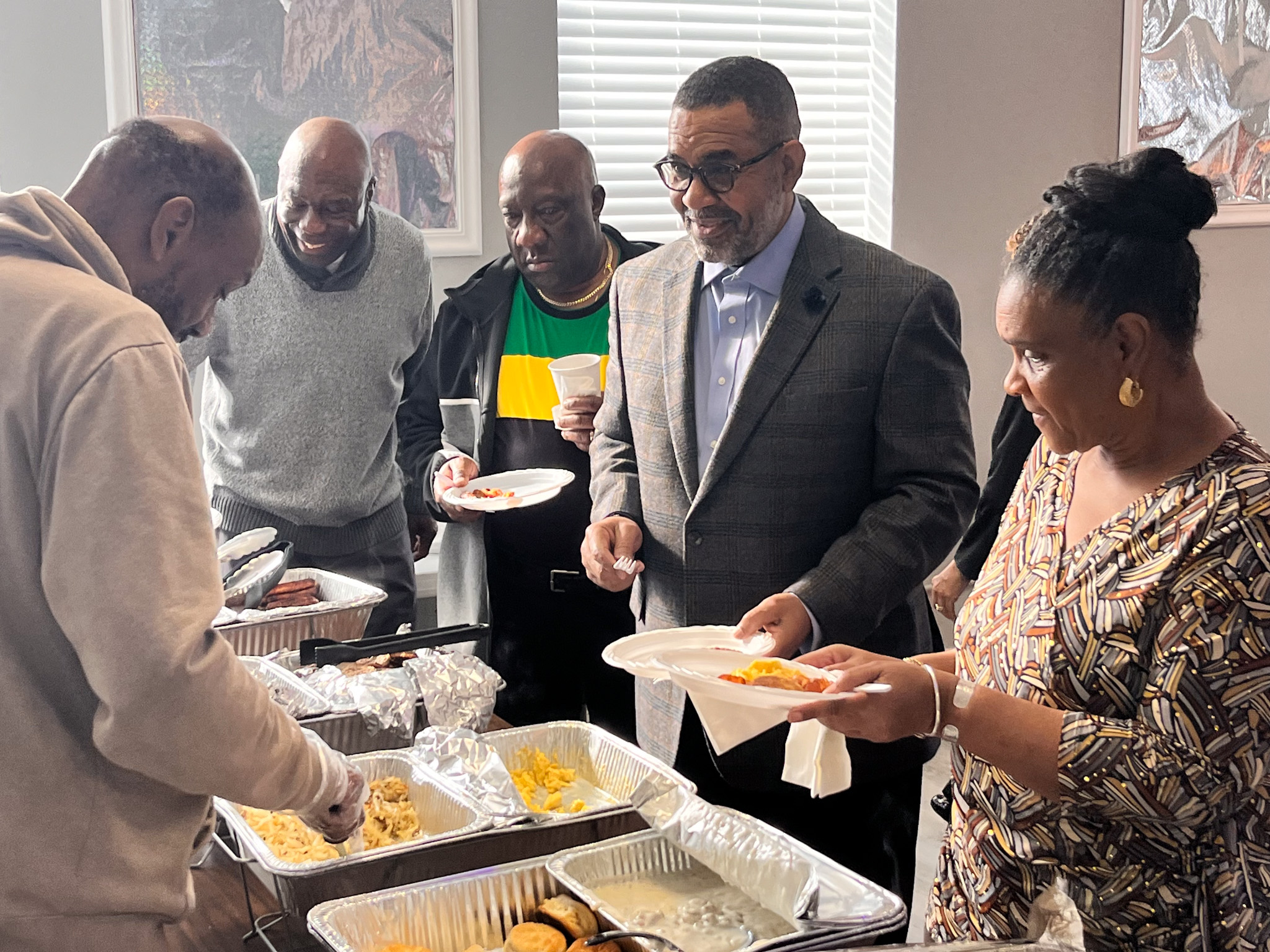By Shelley Mahoney
LANHAM, Md. — Over one hundred people gathered on February 24, 2024, to celebrate the life and ministry of the first American foreign missionary, George Liele, at the second annual George Liele Missionary Conference at Sharon Bible Fellowship Church (SBFC) in Lanham, MD.
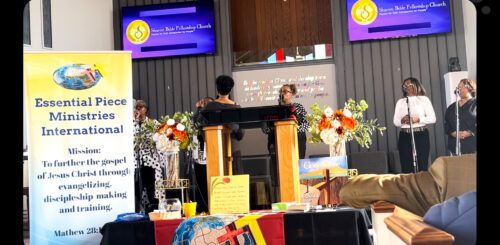
Sharon Bible Fellowship combined choir led a time of worship at the George Liele Missionary Breakfast on February 24. (Photo by Shelley Mahoney)
Members of SBFC cheerfully served a hearty breakfast complete with eggs, grits, biscuits and gravy, coffee, and more. More than 100 people representing 15 churches fellowshipped over breakfast before heading into the sanctuary.
“I like coming to events like this to connect with people from other churches, learn about people, and find out what they’re doing at their churches,” said Kathy Hart, member of First Baptist Church of Capitol Heights. “I’m also excited to learn about missions, which has always been a passion of mine!”
One couple from Oaktown, Maryland, read about the event on the BCM/D webpage and decided to attend to meet new Christians and learn about George Liele. Many came from churches that were affiliated with the African American Fellowship.
“I’m thrilled to be here and to see the impact of George Liele’s missionary efforts as an African American,” said David Gaines, pastor of Manna Bible Fellowship Church, Baltimore
Victor Kirk, conference host and pastor of Sharon Bible Fellowship Church, Lanham, joyfully welcomed everyone and stated that the twofold goal of the event was to bring more awareness to George Liele and to make more churches in the African American Fellowship aware of the many opportunities and options available on the international mission field.
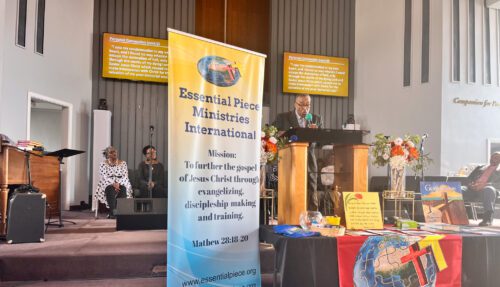
Robert Anderson shares the history of George Liele. (Photo by Shelley Mahoney)
This was followed by prayer and a time of worship, led by a choir singing “We Bless Your Name.”
Robert Anderson, pastor of Colonial Baptist Church, Randallstown, then took the platform to talk about the history of George Liele and his legacy that has echoed through the years in the Baptist faith. He started off by discussing Liele’s early life in slavery, his salvation, and his emancipation from slavery.
“He was baptized and ordained as a slave, but God used him in a marvelous way,” Anderson said, adding that “before he found freedom from slavery, George Liele found freedom in Christ.”
After leaving his life of slavery behind, Liele began evangelizing and planting churches in South Carolina, Georgia, and eventually Jamaica. Anderson pointed out that Liele planted churches everywhere he went and that, in fact, the oldest black Baptist church in America resulted from his evangelistic efforts.
He went on to say that, after planting these churches in America, Liele traveled to Jamaica and began a ministry there that included evangelism and church planting. More than 8,000 souls came to a saving knowledge of Jesus Christ due to Liele’s ministry.
 Anderson pointed out that most people think of Christian heroes like Adoniram Judson or William Carey when they think of the earliest American missionaries, but George Liele actually traveled internationally to share the gospel more than a decade earlier than these men.
Anderson pointed out that most people think of Christian heroes like Adoniram Judson or William Carey when they think of the earliest American missionaries, but George Liele actually traveled internationally to share the gospel more than a decade earlier than these men.
“Liele has been robbed of his place in church history,” said Anderson. It has been my mission to blow the horn and say, ‘How can we talk about missions, especially as Southern Baptists, and not talk about George Liele?’
Dr. Nathan Butler, president of Washington International
Theological Seminary, shared a powerful sermon about the burden that God puts on the hearts of His people to do His will, especially when it comes to evangelizing, church planting, and ministering across multiple nations.
Butler is a Baltimore native, but he felt compelled by God to minister in churches and through international missions.
“After traveling all across Africa with teams, doing everything we do—food drives, clothes, clinicals—I knew there was something more I needed to do,” Butler said. “We fed them, but they were hungry again. We clothed them but the clothes wore out. I wanted to give people something that wouldn’t wear out or leave them wanting more. The Lord laid on my heart to start the seminary.”
Butler became aware of African laws that prohibit men in many countries across the continent from pastoring churches if they do not have a degree or certificate from an accredited college or university. When he founded the Washington International Theological Seminary with a mission to provide a free, quality theological education to men and women across Africa, only thirteen people were involved. As of today, 369 people are enrolled in the university, and more than a thousand documents have been awarded.
Butler encouraged attendees to pray for God to give them a burden to accomplish His will for their lives. He told several moving stories about his missionary journies, then finished by advising his audience to pray fervently.
“We need to trust God!” Butler said. “We limit God! Don’t pray for a car; pray for the dealership. Don’t pray for a house; pray for the neighborhood. I don’t know about tomorrow, but this day, I will trust in the Lord with all my heart. My God owns the cattle on a thousand hills. He makes a way when there’s no way!”
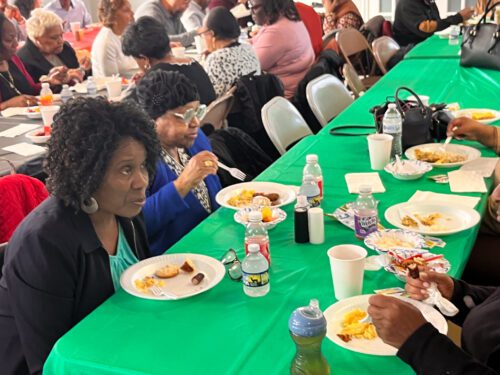
Members of Sharon Bible Church served a hearty breakfast to attendees at the George Liele Missionary Breakfast. (Photo by Shelley Mahoney)
Representatives from Lancaster Bible College and Essential Piece Ministries International were also present to share literature and share their resources.
Special attention was given to the George Liele Missions Fund, an SBC fund that supports international missions. Additionally, African American Fellowship President Nathaniel Thomas shared that the National African Fellowship will sponsor a mission trip to Jamaica on June 20-25 on behalf of George Liele.
“We want to continue the work that George Liele started and continue his efforts today to reach the world with the gospel,” Anderson said, and we want to encourage people of African descent to share the gospel with the world and particularly to be a part of international missions.”
Anderson said that he was excited to see a resurgence of interest in George Liele across the Southern Baptist Convention over the last several years, pointing out the recognition of the first Sunday in February as George Liele Sunday in Southern Baptist churches.
He said that he felt the conference went very well and achieved the goals of educating people about Liele, encouraging donations to the George Liele Missions Fund, and sharing an example of an effective foreign missionary to encourage more people to follow God’s leading towards the mission field. African Americans, in particular, he noted, tend to be hesitant about going to the mission field and feel that they do not have an example to follow.
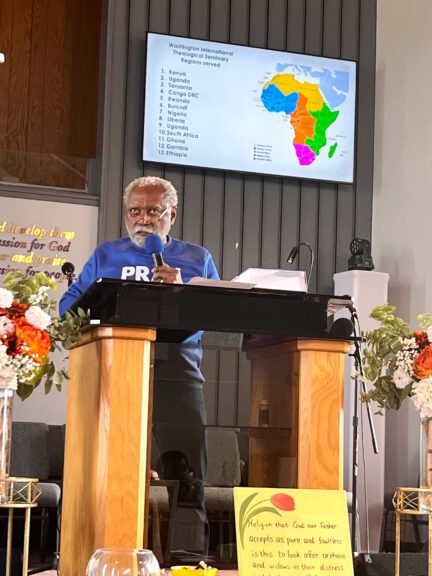
Nate Butler, the president of Washington International Theological Seminary, shares about opportunities for theological education for missionaries to Africa. (Photo by Shelley Mahoney)
“George Liele is that example,” Anderson said. “He went to Jamaica, outside of our country, so if he could do it back then, what are we doing now? And what can we do? My burden, in particular, was to get Southern Baptists to connect with him. He was a Baptist, and to me, that’s an immediate connection, and hopefully, that will be an encouragement to follow.”
“The conference was beyond my expectations,” said Kirk after the event. “I thought it went very well today and it was very informative and very spiritual.”
Next year, a representative from the First African Baptist Church, started by George Liele in Georgia, plans to share a virtual tour of the church building.
Shelley Mahoney is an adjunct professor and freelance writer.

